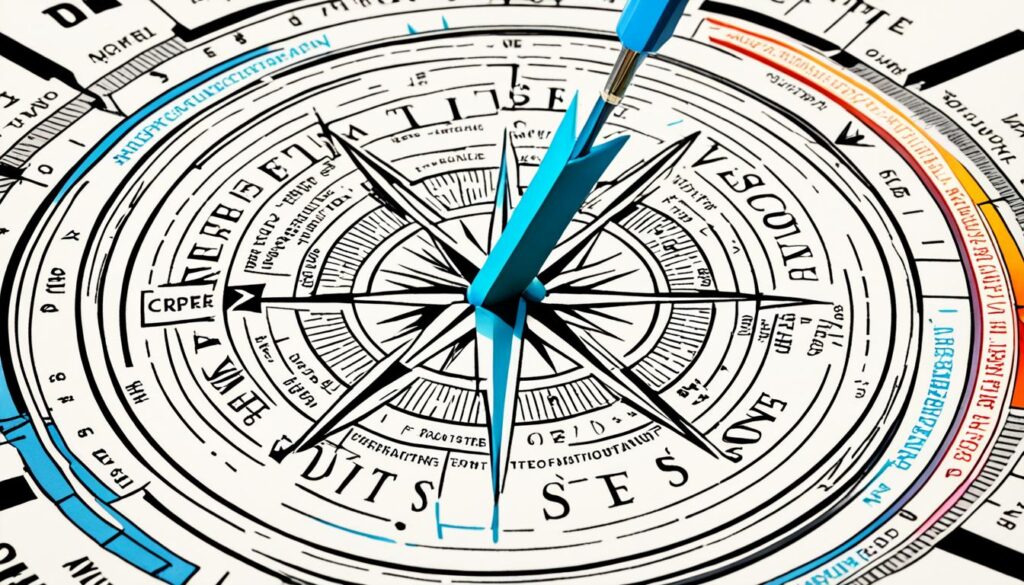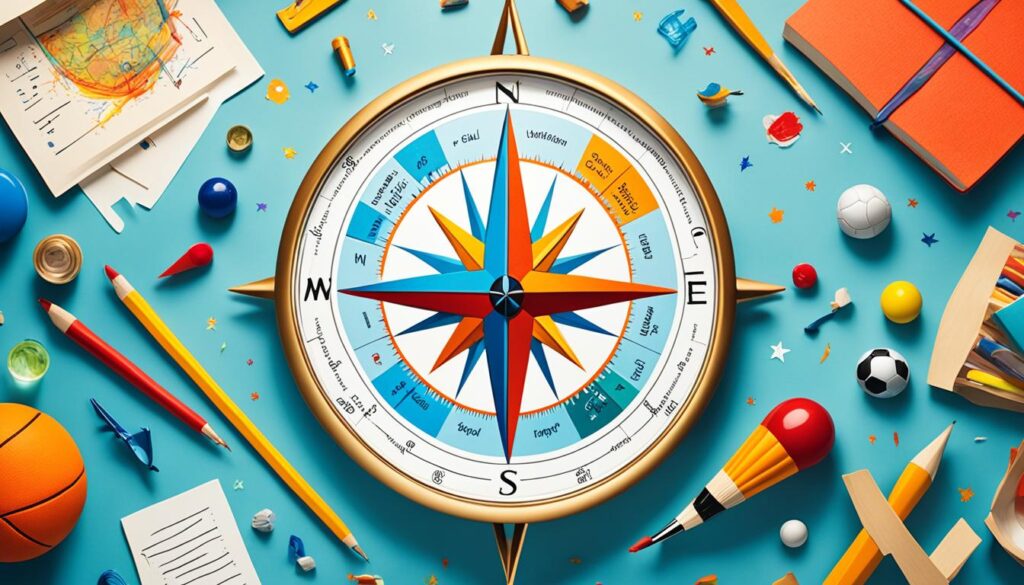Feeling lost and uncertain about your direction in life is an overwhelming experience. It can leave you feeling confused, overwhelmed, and searching for answers. But amidst the chaos, there is hope. Buddhist teachings offer profound wisdom and guidance to navigate through the labyrinth of uncertainty and find your way back to clarity and purpose.
“The trouble is, you think you have time.” – Buddha
This powerful quote reminds us that time is limited, and it’s crucial not to waste it by remaining lost and adrift. Instead, we must take action, explore our inner selves, and embark on a journey of self-discovery to find our true purpose and direction in life.
Key Takeaways:
- Feeling lost is a common experience, but it’s essential to take proactive steps towards finding direction.
- Buddhist teachings offer profound wisdom and guidance to help navigate through feelings of confusion and uncertainty.
- Time is limited, and it’s crucial to seize the opportunity to discover your purpose rather than waiting for it to find you.
- Self-discovery and reflection are key to finding direction and regaining a sense of clarity and purpose.
- Embracing the journey of self-discovery can lead to personal growth, fulfillment, and a greater sense of harmony in life.
Understanding the Fundamental Human Needs
According to psychologist Manfred F.R. Kets de Vries, our sense of meaning and purpose in life is shaped by five fundamental human needs: belonging, purpose, competence, control, and transcendence. These needs collectively define how we experience the meaning of our existence. By addressing these needs, we can reinvent our lives and find a renewed sense of direction.
The Five Fundamental Human Needs:
| Need | Description |
|---|---|
| Belonging | Feeling connected to others, having healthy relationships, and being part of a community. |
| Purpose | Having a clear sense of meaning and direction in life, understanding one’s values and goals. |
| Competence | Feeling capable, developing skills, and achieving a sense of mastery in various areas of life. |
| Control | Having a sense of autonomy, making choices, and feeling in control of one’s own actions and decisions. |
| Transcendence | Seeking experiences that go beyond the ordinary, connecting with something greater than oneself. |

Understanding these fundamental human needs is essential in finding direction and creating a fulfilling life. Each need plays a vital role in our overall well-being and satisfaction. By recognizing and addressing these needs, we can navigate the challenges of feeling lost and embark on a journey of self-discovery and personal growth. Embracing belonging, purpose, competence, control, and transcendence can lead us to a renewed sense of direction and fulfillment in life.
The Dangers of Living Without Direction
Living without a sense of direction can have a profound impact on your mental health and overall well-being. When you lack a clear purpose in life, it can leave you feeling lost, unmotivated, and overwhelmed. The dangers of living without direction extend beyond just emotional distress; they can also increase your risk of mortality.
Research has shown that individuals who don’t have a sense of purpose are more likely to experience negative emotions such as anxiety and depression. Without a guiding light to navigate life’s challenges, it’s easy to fall into a state of hopelessness and despair. The lack of direction can also make it difficult to find motivation, leading to a sense of stagnation and unfulfillment.
Furthermore, living without direction can have serious consequences for your physical health. Studies have found that individuals who lack a sense of purpose have a higher risk of mortality compared to those who have a clear purpose in life. The impact on overall well-being and longevity cannot be underestimated.
Recognizing the significance of finding direction in life is crucial for your mental and physical health. It’s essential to understand that living a purposeful life is not just a luxury but a necessity. Without direction, you’re more likely to face a range of negative consequences that can significantly hinder your happiness and overall quality of life.
By acknowledging the dangers of living without direction, you can take proactive steps to rediscover your purpose and regain a sense of fulfillment. The next section will explore strategies for finding direction and provide you with the tools to navigate your journey towards a more purposeful and meaningful life.
Strategies for Finding Direction
Feeling lost and unsure of your path in life can be overwhelming. However, there are several effective strategies you can implement to help you find direction and regain a sense of purpose. By exploring your interests, modeling others, taking trips, engaging in a unique journaling activity, and utilizing free resources, you can navigate this period of uncertainty and discover the path that aligns with your true self.
1. Explore Your Interests
One key strategy for finding direction is to explore your interests and engage in activities that bring you joy. Take the time to reflect on the things that spark your passion and curiosity. Whether it’s pursuing a new hobby, learning a new skill, or volunteering for a cause you care about, immersing yourself in activities that align with your interests can provide valuable insights and lead you towards your true calling.
2. Model Individuals who Inspire You
Another effective strategy is to look to others who inspire you and align with the life you envision for yourself. Find role models who have achieved success in the areas that interest you. Study their journey, learn from their experiences, and adapt their strategies to fit your own aspirations. Modeling successful individuals can help you gain clarity on your own goals and inspire you to take action to achieve them.
3. Take Trips to Broaden Your Perspective
Traveling to new locations can be a powerful catalyst for finding direction. Exposing yourself to different cultures, environments, and perspectives can broaden your horizons and ignite new passions. Whether it’s a weekend getaway to a nearby town or an adventurous trip to a foreign country, immersing yourself in new experiences can provide fresh insights and help you discover hidden interests and talents.
4. Engage in a Unique Journaling Activity
A unique journaling activity can be a transformative tool for self-discovery. Imagine yourself as an alien in your own life, observing and questioning every aspect. Write down your observations, thoughts, and feelings as you explore different areas of your life, including relationships, career, and personal growth. This imaginative exercise can provide a fresh perspective and unlock deep insights about what truly matters to you.
5. Utilize Free Resources
The digital age offers an abundance of free resources that can guide you on your journey towards finding direction. Take advantage of platforms like YouTube, podcasts, and online articles that provide guidance and inspiration. Seek out experts in your fields of interest and learn from their expertise. Utilizing these free resources can offer valuable knowledge and support along your path of self-discovery.

By employing these strategies, you can navigate the challenges of feeling lost and set yourself on a path towards personal fulfillment and success. Remember to embrace the journey, be open to new experiences, and trust in your ability to find the direction that is true to your heart.
Reflecting on Values and Passions
When you find yourself in search of direction, taking the time to reflect on your values and passions is paramount. This introspective process allows you to delve deeper into what truly matters to you, beyond the surface-level desires that often cloud our judgement.
Begin by finding a quiet space where you can sit and contemplate. Close your eyes, take a deep breath, and let your mind wander. Think about the principles and beliefs that guide your life, the causes that ignite a fire within you, and the qualities you hold dear.
In this moment of self-reflection, focus on rediscovering your passions. Recall the activities and pursuits that have brought you genuine joy and fulfillment in the past. Maybe it’s painting, playing a musical instrument, or immersing yourself in nature. Whatever it may be, reconnecting with these passions can reignite your sense of purpose and propel you forward.
As you reflect on your values and passions, it’s important to align them with your goals. Consider your strengths and how they can be leveraged to create a roadmap for finding direction. Setting meaningful goals that align with your values and passions will guide you towards a life of purpose and genuine fulfillment.

Reflecting on your values and rediscovering your passions is a powerful journey of self-discovery. It provides the foundation upon which you can build a life that aligns with who you truly are. Embrace this process, embrace the uniqueness of your values and passions, and let them guide you towards a future filled with purpose and meaning.
Showing Self-Compassion and Building Connections
In the journey to finding direction in life, one of the most crucial aspects is showing self-compassion. It is natural to encounter setbacks and challenges along the way, but being kind and understanding towards yourself can help maintain motivation and resilience. Self-compassion involves treating yourself with the same care and compassion that you would extend to a close friend or loved one.
Building connections with supportive individuals and surrounding yourself with a strong community can also play a vital role in overcoming feelings of meaninglessness. Having people who understand and empathize with your struggles can provide a sense of grounding and create an environment that fosters growth and personal development.

Healthy relationships and a support system contribute to mental well-being and help navigate the journey towards finding direction. These connections offer guidance, encouragement, and a sense of belonging, allowing you to explore your true potential and discover new possibilities.
Conclusion
Feeling lost and uncertain about your direction in life is a common experience. However, there are strategies you can implement to navigate this journey of self-discovery and regain a sense of purpose and fulfillment.
Start by reflecting on your values and passions. Take the time to sit and think about what truly matters to you, beyond superficial desires. By rediscovering your passions and identifying your strengths, you can align your goals with what brings you joy and create a roadmap for finding direction.
Building connections and seeking support is also crucial in this process. Surround yourself with individuals who believe in you and your abilities. A strong support system and a sense of community can provide a grounding presence and help you overcome feelings of meaninglessness.
Throughout this journey, remember to practice self-compassion. Embrace setbacks and challenges as opportunities for growth and learning. By being gentle with yourself and seeking the support you need, you can navigate the path towards finding direction, leading to personal growth, fulfillment, and a greater sense of harmony in life.
FAQ
What can I do when I feel lost?
When you feel lost, there are several steps you can take to find direction and regain a sense of fulfillment. These steps include exploring Buddhism’s teachings, practicing mindfulness and compassion, and reflecting on your personal values and goals.
How can I understand the fundamental human needs?
According to psychologist Manfred F.R. Kets de Vries, the fundamental human needs that shape our sense of meaning and purpose in life are belonging, purpose, competence, control, and transcendence.
What are the dangers of living without direction?
Living without direction can negatively impact your mental health and overall well-being. You may experience negative emotions, struggle with motivation, and have an increased risk of mortality.
What strategies can I use to find direction?
To find direction, you can explore your interests, engage in activities that bring you joy, model individuals who inspire you, take trips to new locations, try a unique journaling activity, and utilize free resources such as YouTube videos and podcasts.
How important is reflecting on my values and passions?
Reflecting on your values and rediscovering your passions is crucial for finding direction in life. It helps you identify what truly matters to you and sets the foundation for meaningful goals.
How can I show self-compassion and build connections?
It’s essential to practice self-compassion throughout your journey of finding direction. Be gentle with yourself, seek support from supportive individuals and build connections within a strong community. These relationships and support systems can contribute to your mental well-being and help navigate the challenges of feeling lost.
What is the significance of finding direction in life?
Finding direction in life is crucial for personal growth, fulfillment, and a greater sense of harmony. It allows you to align with your values, passions, and strengths, leading to a more meaningful and fulfilling life.

